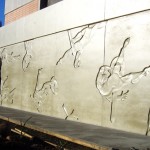Humbaba’s Barrel 2006
Eucalyptus cord wood, Reinforcing steel substructure, Internal Wood frame.
Height 4.2m diameter 2.5m Approx. 4 tonnes
Statement
The form is a hollow stack of cordwood that is supported from within by a central wooden pole. Steel ribs are attached to the pole and the cordwood is wired in to the ribs.
With climate change increasingly in our consciousness we are, in fact, reliving a story that was told over 5000 years ago about the interaction of humans with the natural world;
Excavated from modern day Iraq in 1905 were 12 stone tablets with inscribed cuneiform marks that could be deciphered after the recent uncovering of the Rosetta Stone. The tablets written in 3000BC Uruk were telling of the achievements of King Gilgamesh, the King of the time. He was so powerful in his conquests that he was seen as half god and half human… Gilgamesh and his great friend Enkidu grew more and more hungry for success as they overtook other lands. They began to challenge the will of the gods with hubris and disrespect.
The story goes that two reckless warriors turned their challenge to the Forest Keeper Humbaba; an incredible force of elemental proportions dwelling in the vast forested hills and mountains. The two trekked to the forested hills and began smashing in to the great cedar trees, falling them and setting fire to whole hillsides. Attracting the wrath of Humbaba, the two mortals battled the giant for days on end. The Forest Keeper was eventually trapped into submission and executed in a pile of burning forests.
Much later in the story the victors were subdued when they were ordered by the gods to enter the underworld but in the meantime the world of humankind was led to believe that the world was better without the control of the natural elements over human activity.
As an observer of our contemporary culture 5ooo years later I am intrigued that human nature has not changed with respect to the natural environment. It appears that our collective human choices are further conducting the hubris and recklessness sported by King Gilgamesh so early on in our recorded history
The ancient vessel form constructed here is a marker of our contemporary paradigm. At once we are tempted to burn a huge pile of wood as a huge form of power release while, at the same time, we all know that each small piece of firewood could cook a meal for us and warm our home, taking much more careful and respectful use of the resources we control. Now, in our contemporary climatic instability it appears that we are peering down Humbaba’s barrel – we are yet to see from which end…


